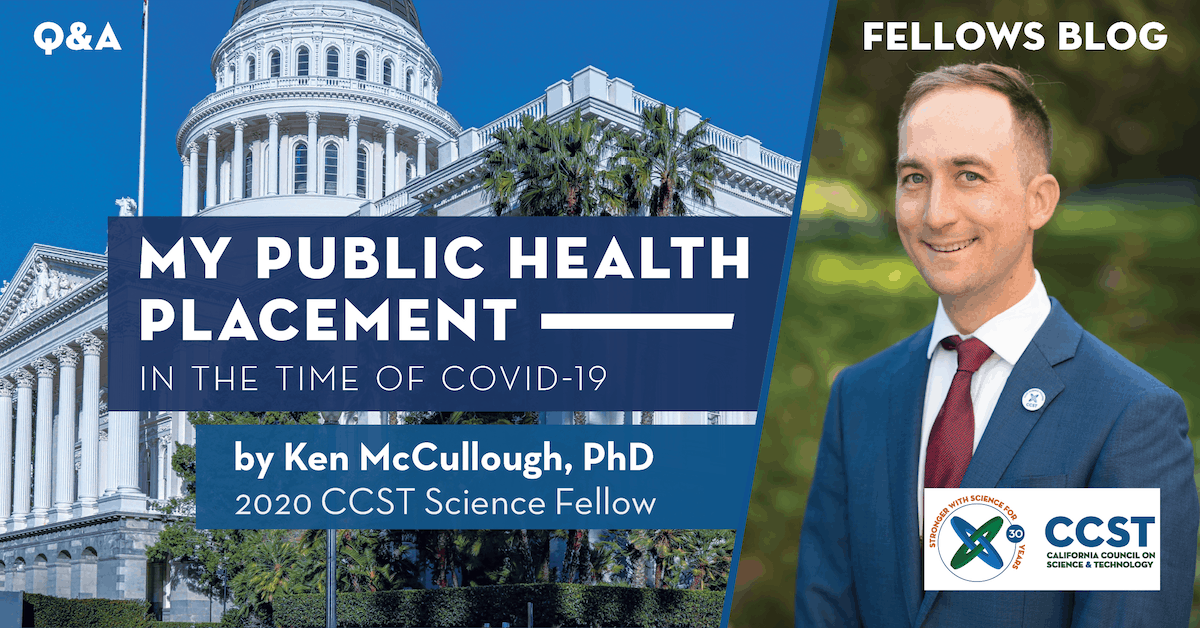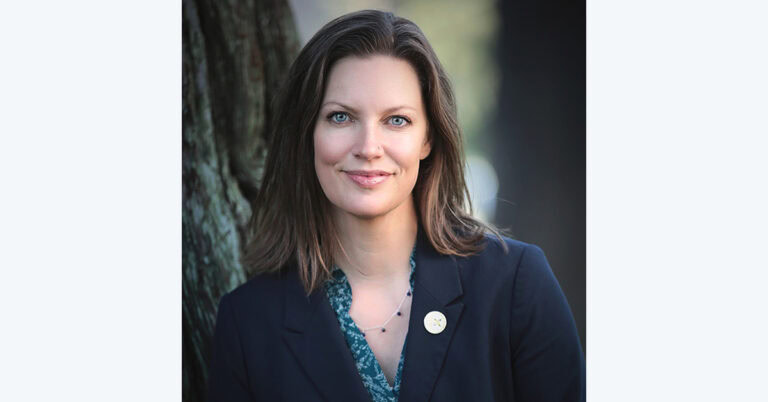Deputy Director
Q&A: My Public Health Placement in the Time of COVID-19
June 23, 2020 | CCST Newsroom, CCST S&T Policy Fellows

Ken McCullough is currently a 2020 CCST Science & Technology Policy Fellow, part of the first class to include Executive Branch placements. Ken received a PhD in Neuroscience from Emory University. Raised in Arizona, Ken studied the neurobiology of fear and PTSD for his dissertation, then chronic stress, depression and sleep at Harvard. He received a BA in Molecular and Cellular Biology from Lewis and Clark College.
Where are you placed, what does your office do, and what are your main projects?

My CCST Science Fellows placement is split between the Office of the California Surgeon General (OSG) and the California Initiative to Advance Precision Medicine (CIAPM) within the Governor’s Office of Planning and Research (OPR). This has been a fantastic placement because I get to participate in a very wide variety of projects within these groups and am getting a sense of how different offices and agencies function. I also get to work closely with two CCST Science Fellows alumni, Shannon Muir (’15) and Julianne McCall (’17), who are co-directors of CIAPM.
One of my main roles at the OSG is to help with writing the first Surgeon General’s Report. California’s Surgeon General, Dr. Nadine Burke Harris, has set a goal of reducing adverse childhood experiences (ACEs) and ACE related health and psychiatric disorders—the ACEs Aware initiative. As part of the writing team, I am helping to develop the report that will discuss (1) what we know about ACEs and their effects on health and well being, (2) what the ACEs Aware initiative and other initiatives within and outside of California state government are doing to address trauma and provide trauma informed care, and (3) the future of addressing traumatic stress across sectors of California state government.
As a graduate researcher and postdoctoral fellow, I researched preclinical models of traumatic stress in the context of PTSD and childhood trauma, so I am thrilled to be able to contribute my understanding of fundamental neurobiology to these complex initiatives.
CIAPM is an incredible initiative because it seeks not only to advance precision medicine in California, but to do so in a way that requires real collaboration between researchers and community partners. These projects will ensure that advances in precision medicine are applicable, affordable, and attainable to all Californians regardless of race and socioeconomic status.
My work with CIAPM is closely tied to the ACEs Aware initiative. We released a request for proposals (RFP) for projects that investigate precision medicine approaches for addressing ACEs and toxic stress. Going forward we will select which projects to fund then track and administrate these grants.
As a graduate researcher and postdoctoral fellow, I researched preclinical models of traumatic stress in the context of PTSD and childhood trauma, so I am thrilled to be able to contribute my understanding of fundamental neurobiology to these complex initiatives.
How has your work situation changed since COVID-19? Has it been challenging? How have you adjusted?
My work has been dramatically changed by COVID-19; however, given the focus of our efforts it is more important than ever. Research demonstrates that natural disasters are extremely traumatizing, especially to children in underserved communities. Children who have already experienced adversity may face new difficulties and, for some children, COVID-19 may lead to traumatic experiences that affect their health and well-being for the rest of their lives. It is extremely important to continue working to provide trauma-informed care to both children and adults in difficult circumstances, so that they can maintain their physical and mental health and build resilience in these difficult times.
This need for trauma-informed care makes our work on the ACEs Aware initiative all the more important and highlights the timeliness of a current CIAPM initiative: Addressing Health Impacts of Adverse Childhood Experiences through a Collaborative Precision Medicine Approach.
My work has been dramatically changed by COVID-19; however, given the focus of our efforts it is more important than ever.
My day-to-day work has shifted so that I am writing from home and attending meetings digitally. This has made forming personal connections somewhat more difficult; however, being surrounded by passionate, supportive, and driven people has helped me adjust to the new pace of life.
Are you working in response to the COVID-19 crisis in any way? How so?
In addition to my previous work with the OSG and CIAPM, I have been assigned to several task forces that bring together different departments within the California state government and outside groups such as health care providers to mobilize the considerable resources within the state to address the COVID-19 crisis. Currently, I am on the California Coronavirus Testing Task Force that has identified testing options, sources for testing supplies, locations for testing sites, and other logistical hurdles in the way of building a statewide testing infrastructure necessary to ensuring the health and safety of all Californians.
We have now passed 3 million tests reported in California and are conducting well over 60,000 tests a day. This is an important milestone because it represents doing 1.5 tests per 1000 Californians per day, a level of testing that when combined with a robust contact tracing program, which is also being established, is predicted to be sufficient to prevent uncontrolled spread of the COVID-19 virus. Participating in this task force was certainly not in the description of potential CCST placements; however, it has been and continues to be an incredibly valuable experience.
###
About the California Council on Science and Technology
The California Council on Science and Technology is a nonpartisan, nonprofit organization established via the California State Legislature — making California’s policies stronger with science since 1988. We engage leading experts in science and technology to advise State decision makers — ensuring that California policy is strengthened and informed by scientific knowledge, research, and innovation. Learn more about CCST Science Fellows.




